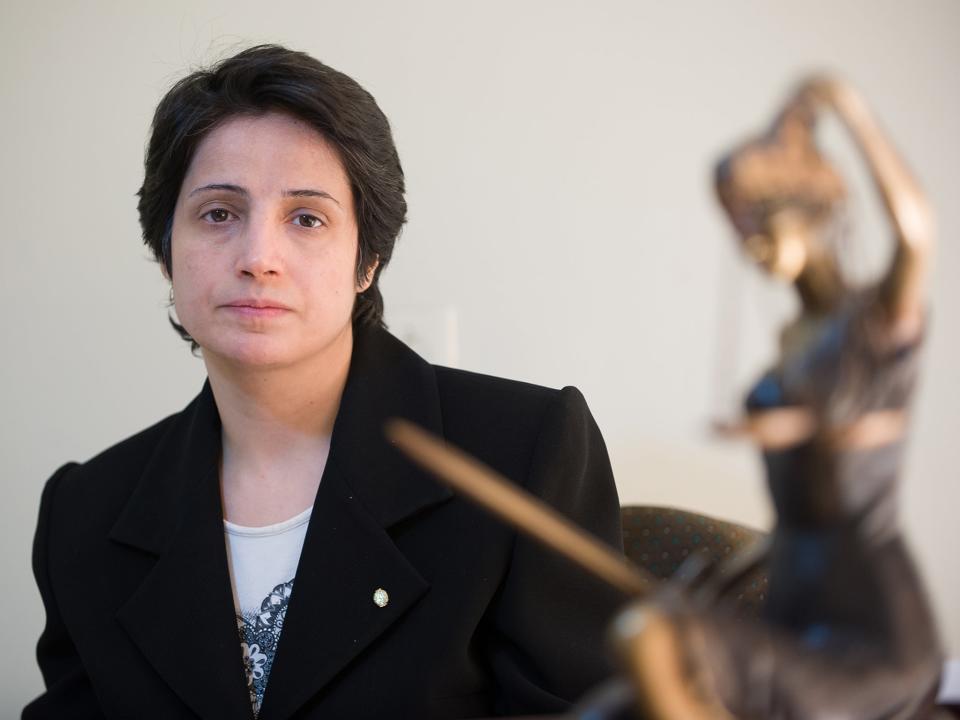Iran condemned for sending leading human rights defender back to prison despite health fears

Campaigners say the authorities in Iran - the country worst hit by the pandemic in the Middle East - have failed to protect prisoners of conscience in the wake of the coronavirus crisis
Iran’s leading human rights defender should not have been transferred from her home back to prison due to her deteriorating health, her husband has told The Independent.
Nasrin Sotoudeh, a lawyer who represented women who protested against the forced hijab, was allowed to return home at the beginning of last month after being given temporary release to allow her to have treatment for heart and lung problems.
Ms Sotoudeh’s husband has said his 57-year-old wife was transported back to jail on Wednesday without ever receiving the medical treatment she needs.
Reza Khandan said his wife tested positive for coronavirus on 10 November, just after being temporarily released from prison, and he is anxious about her health.
“Nasrin’s body is very weak and exhausted after being on hunger strike for 46 days and two and a half years' imprisonment. Her body hasn’t recovered, considering her age and being on hunger strike multiple times," he told The Independent.

Nasrin Sotoudeh and her husband Reza Kahndan
Getty“The first days of medical leave, we found out that she was infected by coronavirus in prison and we couldn’t start her medical care. She is very weak and her body has lost its strength. To recover at her age is very hard and takes time. I am worried about her health.
“They sent Nasrin to Qarchak prison, despite the government doctor saying that Nasrin needs two more weeks to recover from the disease and still needs to wear a mask, even inside the house.”
It comes after campaigners recently told The Independent Ms Sotoudeh was in a life-threatening condition and “on her last legs” after authorities signed the prisoner’s “death warrant” by denying her an urgent heart-related procedure.
In September, leading human rights charities said Ms Sotoudeh had been transferred from Evin Prison to Taleghani Hospital’s intensive care unit in the capital of Tehran due to her deteriorating health, difficulties with breathing, and serious heart problems.
Ms Sotoudeh’s 46-day long hunger strike, which finished in late September, called for political prisoners and human rights activists to be released from jail amid the Covid-19 emergency.
Campaigners say the authorities in Iran - the country worst hit by the pandemic in the Middle East - have failed to protect prisoners of conscience in the wake of the coronavirus crisis.
Ms Sotoudeh, a laureate of the European parliament’s Sakharov Prize, was arrested on charges of collusion and propaganda against Iran’s leaders in 2018 and handed a 38-year prison sentence and 148 lashes.
Yonah Diamond, a human rights lawyer who serves on her international legal team, told The Independent: ”We hope the Iranian leadership knows that the imprisonment of Nasrin Sotoudeh, in clear violation of their own constitution and international law, is only harming the government’s credibility with the international community.
“The UN, the European parliament, US President-elect Joe Biden and other world leaders have repeatedly called for her unconditional release — pressure that will continue to mount as the government jails a symbol of the struggle for justice, peace, and equality. Nasrin is increasingly known as Iran's Mandela and, much like Mandela, the world will not rest until she’s free.”
It comes after Mr Diamond, who works for Raoul Wallenberg Centre for Human Rights, said Ms Sotoudeh had suffered mistreatment when she was recently in hospital.
He said: “At the hospital, she was constantly monitored by security forces, rather than receiving adequate medical treatment. Her hospitalisation can only be characterised as continued ‘confinement,’ as her husband put it. Her family was left completely in the dark, barred from seeing her or her medical records, or speaking with medical personnel. Worse, the only time they saw her was to witness the security forces physically abuse her while she was in a wheelchair.”
Ms Sotoudeh, who denies the charges against her but has been detained since June 2018, was moved on 20 October from Evin Prison to Qarchak - a jail in the desert which campaigners say is notorious for having the “worst prison conditions” in Iran.
Shaparak Shajarizadeh, a woman’s rights activist who is one of Ms Sotoudeh’s last clients, told The Independent: ”When Nasrin Sotoudeh accepted to be my attorney, she knew the risk that she was taking. She told me that she was one of us and was supporting our cause of opposing the ‘compulsory hijab’ by defending us.”
Women’s rights are stringently restricted in Iran and wearing a headscarf is compulsory in public for all women there – with those who do not wear a hijab, or have some of their hair on display while wearing a hijab, facing punishments ranging from fines to imprisonment.
Leading human rights organisations, the Raoul Wallenberg Centre for Human Rights, the International Bar Association’s Human Rights Institute, the Centre for Human Rights in Iran, and PEN America have demanded the “immediate quashing of the cruel and unjust sentence” handed to Ms Sotoudeh in an open letter to Iran’s leaders. The campaigners also called for the six-year jail sentence and two-year travel ban against her husband Mr Khandan to be quashed.
“During her strike action, Iranian authorities continued to harass her family; after freezing Ms Sotoudeh’s bank account earlier this year, a team of intelligence agents briefly arrested her 20-year-old daughter, Mehraveh,” they said. “Following the end of Ms Sotoudeh’s hunger strike and transfer to the hospital, she was detained and abused, and returned to Evin prison without having received the medical treatment she required.”
Read More
Iran’s leading human rights defender ‘on her last legs’ in jail
Daughters of the revolution: The Iranian women fighting the hijab

 Yahoo News
Yahoo News 